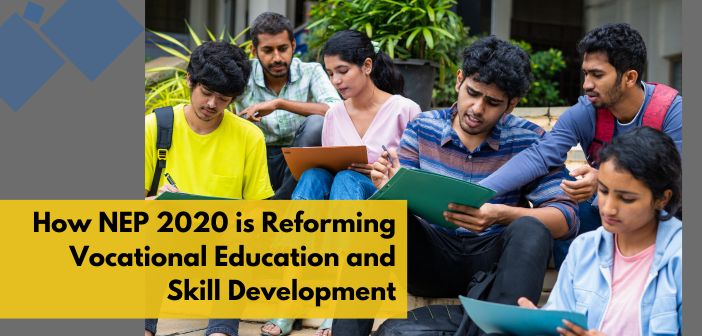 Imagine a world where education isn’t just about memorizing facts or acquiring theoretical knowledge, but it’s about equipping you with the skills to thrive in the real world. A world where learning goes beyond textbooks and classrooms, and prepares you for the ever-evolving demands of the job market. This is becoming a reality thanks to the National Education Policy (NEP) 2020.
Imagine a world where education isn’t just about memorizing facts or acquiring theoretical knowledge, but it’s about equipping you with the skills to thrive in the real world. A world where learning goes beyond textbooks and classrooms, and prepares you for the ever-evolving demands of the job market. This is becoming a reality thanks to the National Education Policy (NEP) 2020.
The Indian education system is undergoing a significant transformation with NEP 2020. The policy proposes a paradigm shift in how we approach through holistic and multidisciplinary learning. By emphasizing vocational education and skill development, it paves the way for an education system that equips students with the practical skills needed to prepare for the dynamic world of work. This article explores the key aspects of NEP 2020’s focus on vocational education and skill development and how it paves the way for connecting academia with industry.
NEP 2020’s Vision for Skill Development
NEP 2020 goes beyond conventional notion of education that was mostly confined to formal, linear, academic learning. It proposes a complete reimagining, with a core focus on seamlessly integrating vocational education into mainstream curriculum. The emphasis on hands-on exposure to crucial areas like IT and digital skills and other emerging technologies that aims to equip students with not just theoretical knowledge, but also the practical ability to tackle real-world challenges with confidence.
Fostering Collaboration Between Academia and Industry
A key pillar of NEP 2020 is the crucial collaboration between academia and industry. The policy recognizes that education cannot exist in isolation from the world of work. By aligning curriculum with industry requirements through frameworks like NSQF, NEP 2020 ensures graduates possess the tangible skills sought by employers. The sensitisation towards skills and work-integrated learning is expected to start early in the schools.
Vocational Education in the Digital Age
In today’s digital landscape, technology is no longer just an enabler for education; it’s the driving force. NEP 2020 acknowledges this reality and recommends leveraging technology to design and deliver vocational education innovatively for better access and reach. By exhorting the use of AI-enabled adaptive learning platforms and interactive tools, the policy caters to diverse learning styles, making education inclusive, relevant and meaningful for all. This tech-driven approach propels us towards a future where learning knows no limitations.
Let’s delve into how NEP 2020 envisions technology as an enabler for vocational education.

Leveraging Technology as an Enabler
Technology enables virtual simulations, remote access to practical training, and real-time feedback mechanisms, revolutionizing how vocational education is imparted. This approach not only enhances the quality and effectiveness of learning but also ensures that education remains adaptive and responsive to the evolving needs of learners and industries alike. Technology enables access to quality training at scale while also facilitating seamless collaboration, empowering learners to acquire industry-relevant skills efficiently. Embracing technology as an enabler ensures its accessibility, relevance, and effectiveness for learners across diverse backgrounds.
Challenges and Solutions – Paving the Way for Successful Implementation
The agenda of NEP 2020 to integrate vocational and skill-based courses with general education comes with a few critical challenges. We need to overcome these challenges for smooth implementation in schools and colleges, this includes:
- Shifting Mindsets: Overcoming traditional mindsets that view vocational education as inferior.
- Curriculum Integration: Seamlessly integrating vocational programs into existing curriculum.
- Infrastructure Development: Upgrading infrastructure to support practical training needs.
- Teacher Training: Equipping teachers with the skills to deliver vocational education effectively.
- Standardized Assessment: Establishing standardized assessment and certification processes.
Addressing these challenges requires a multi-pronged approach
- Capacity Building: Implementing programs to enhance educators’ skills.
- Awareness creation: Making all stakeholders aware of the benefits of work-integrated learning
- Structured Training Modules: Developing structured training modules for smooth curriculum integration.
- Tech-Driven Solutions: Utilizing technology to address infrastructure limitations.
- Industry Collaboration: Collaborating with industry leaders for standardized assessments and certifications.
Skill-Based Education through NEP 2020
NEP 2020 is more than just a policy; it’s a clarion call to reflect on our education system as technology disrupts how we learn and work. It’s a blueprint for building a future where education empowers individuals and fuels India’s success. By embracing vocational education and skill development, we can unlock the potential of every student and propel the nation towards a future of innovation and progress. By seizing the opportunity to create a new educational landscape, learning can truly become a journey of discovery and empowerment, preparing individuals for the jobs of tomorrow.
Also read: Bridge the Gap through Industry-Ready Skills for Emerging Technologies
TCS iON’s Innovative Approach – Pioneering the Path to Progress
TCS iON is well-positioned to lead the change with innovative initiatives. Through their pioneering vocational programs, TCS iON embodies the spirit of NEP 2020. Their impactful educational offerings transcend boundaries and transform lives. By leveraging technology, TCS iON ensures that learners are not just equipped with skills, but empowered to chart their own destinies.
If you wish to know more about the innovative vocational programs, please visit TCS iON’s official website for more information.












